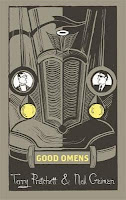Good Omens by Terry Pratchett and Neil Gaiman: a review
Years ago, I listened to the radio
adaptation of this book and I knew I wanted to read the book. I did not read
the book. Earlier this year, I watched the TV adaptation and, once again, got
the urge to read it. I even bought a really lovely copy to encourage me to read
it. It took me months to get into reading it. I knew I’d love this book, so I
don’t know why it took me so long.
Good
Omens by Terry Pratchett and Neil Gaiman follows a multitude of characters
in the 11 years after the birth of the Anti-Christ. There’s the ethereal
conflict of Heaven and Hell, but there’s also wonderful views into childhood
and growing up. It isn’t so easy to sum up the plot completely because there
are many different plot threads.
As
a lover of Terry Pratchett’s work, I’m so glad the footnotes are a huge part of
this book. Knowing that they are a huge signature of his work, I assumed they
would be featured, but I am so happy to see them so heavily featured in Good
Omens.
When
I started reading this book, it was one of the first books I read without audio
narration. I never felt like I needed it, and that was so refreshing.
Sometimes, with books with this length, I start to get to a point where I
struggle to continue without audio, but here I never felt like I needed it. It
felt really good. It was really compelling.
Many
of the books I’ve been reading have been for class, or a quick read. This
taking some time felt good to pick up every now and again. It was nice that
this took a little time to read. I only read for about an hour at a time, and only
a once or twice a week, so it did take me rather a while to read. I liked that
though. It good was to have something to repeatedly go back to.
““Upbringing
is everything. Take it from me”” is a really heart-breaking line from Crowley. It
shows that him falling (or sauntering) from grace was a case of necessity. The angels
rarely treat their own any better than their enemies. Crowley’s skills were
better placed with Hell because they respected his work (or what they perceived
as his work).
Of
all the Horsemen, Famine was the worst one to read about. The diet plans were
truly grotesque, and seems to me the sort of thing that has Gaiman’s signature
on it. While Pratchett makes social commentaries, they lack that sense of
nausea that Gaiman so frequently brings to his work. Similarly, later on in the
novel, there’s a scene in a call centre that made my skin crawl. I nearly was
sick reading that. The bugs crawling through people was truly revolting. It’s
masterful work, but it is appalling if you’ve just eaten.
A
line that I feel more likely comes from Pratchett’s hand, however, is:
“Most
books on witchcraft will tell you that witches work naked. This is because most books on witchcraft are written by men.”
It’s a bloody beautiful line, and I
think it might just be one of my favourite lines of the book.
Early
on in the book, there’s a baby swap that occurs with three children. We learn
the fate of two of them, very quickly, but the third isn’t given much. There’s
a bit that tells you to imagine what becomes of the boy, but that’s about it
during that early scene. Later on, we get a footnote from Pratchett that gives
just a little explanation about that third baby, and it’s a really nice little
tie-in.
I
loved seeing all the little signs leading up to Adam becoming the anti-Christ. I’m
sure that, when I inevitably read it again, I’ll spot even more. It’s
foreshadowing done really elegantly. It doesn’t feel forced at all. When I read
R.S Belcher’s Shotgun Arcana, I felt like the foreshadowing was really
forced. There was little to no subtlety to it. It wasn’t something that I noticed
later on as things came together. With Good Omens, the foreshadowing was
done so well. There were ongoing themes that only made more sense the further
it went on. Adam’s anti-Christ personality was shown subtly in little ways, so its
final form had real impact and worked so well. The less subtle parts were
knowingly not subtle. Belcher’s work felt like it might have supposed to have been
subtle, but didn’t quite manage it. Pratchett and Gaiman’s knowing lack of subtlety
works really well. In particular, I’m thinking of any scene with the Horsemen
in it (either the actual horsemen or the other horsemen).
Speaking
of the Four Other Horsemen, I think they might be some of my favourite
characters in the whole book. The name choices and subsequent frequent changes
are so funny. There isn’t a single scene with them in that I didn’t enjoy.
This
is a book I wholeheartedly recommend. It’s so much fun, and such a brilliant
showcase of both authors’ styles. If you watched the show or listened to the
radio production, and never read the book, absolutely get onto it. It is so good.
Definitely find yourself a copy.



Comments
Post a Comment